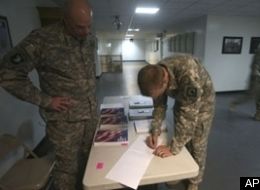
Looking at a timeline of the Franken-Coleman Senate race (especially now that Specter's switch to Democrat has made Franken's seat the 60th Dem. Caucus seat) it has never been more clear how important it is to:

1.
Vote. 225. 215. 133. 49.
These are just a few of the numbers of different kinds of ballots that that were fought over fiercely by both camps, and ultimately ended up counting big time. How many people do you know who didn't cast a ballot last year?
2.
Vote well.The State Canvassing board spent weeks poring over confusing ballots, which had multiple candidates checked, included voter-

identifying marks, or even had pictures drawn on them. This process and resultant fallout has pushed back the seating of the MN State Senate seat for 4 months and counting.
3.
Have a paper trail.The hand recount and physical examination of regular, challenged and absentee ballots- which added votes to both candidates and took away Coleman's lead- would not have been possible without a paper ballot audit trail.
Enjoy.
"A Timeline of Errors" or"Why it is important to vote on Election Day"
by Norm Coleman and Al Franken
The players: - Norm Coleman, incumbent Republican Senator
- Al Franken, liberal media personality and Democratic candidate for MN US Senate
- 2.8 million voters, 78% of the dutiful citizens of Minnesota
- Mark Ritchie, MN Sec. of State and member of MN canvassing board
- MN Supreme Court
11/4/2008: 2008 General Election. 78% of Minnesotans turn out to cast 2.8 million ballots.
11/18/2008: Franken comes in 215 votes under Coleman (less than a .0075% lead). The closeness of the race mandates a recount.
11/19/2008 : Hand recount commences. Representatives of Coleman and Franken are on hand
challenging ballots, which are sent to the Canvassing Board for review.
12/05/2008: 133 ballots go missing in one precinct during the recount. The envelope of ballots never turns up. The Board decides to use the Election Day totals for those wards, which
contributes 46 votes to Franken's total.
12/05/2008: Last day of the recount. Each candidate has gained votes as a result of the recount process.
12/16/2008: 1,325 challenged ballots are addressed by Canvassing Board. Each candidate originally challenged around 3,300, but were required by Sec. of State Ritchie to withdraw some.
12/16/2008: MN Supreme Court rules that wrongly rejected absentee ballots, which some counties have already started identifying, can be included in the recount/challenge.
12/19/2008: Board concludes reviewing the challenged regular ballots. 319 are awarded to Coleman, 758 to Franken, and 248 are labeled "other".
12/30/2008: Franken is left with a 49 vote lead after recount of regular ballots.
12/30/2008: 1350 improperly rejected absentee ballots have been received by the Canvassing Board.
Of these, 933 are found to be eligible.
1/3/2009: 481 ballots for Franken and 305 for Coleman are yielded in a count of the newly-approved absentee ballots (with 147 for other candidates). Norm Coleman's Senate term officially expires, with no one seated.
1/5/2009: Franken leads by 225 votes in the
Canvassing Board's certified ballot recount total.
1/6/2009: Coleman files for an election contest. By law as a result, Franken cannot be issued an election certificate until the contest is resolved. A 3-judge panel is appointed to hear the contest.
2/3/2009: Judges agree to consider 4,797 rejected absentee ballots. This number including only those where voters either met all legal requirements, or failed to meet them through no fault of their own.
2/13/2009: Number of ballots cut to 3,500 rejected absentee ballots after a court ruling on evidence.
3/31/2009: At most 400 rejected absentee ballots are ordered to be counted
.4/7/2009: Franken emerges with a final margin of 312 votes after a court determines that 351 of these ballots were legally cast. 111 go to Coleman, 198 to Franken, and 42 to Other.
4/13/2009: MN Supreme Court dismisses Coleman's suit "with prejudice" in its final ruling.
4/20/2009: Coleman files appeal to Minnesota Supreme Court.
4/28/2009: Sen. Arlen Specter, in a stunning move, announces he is switching from Republican to Democrat. This heightens the tension on the Franken-Coleman case, as a seated Democratic
Franken would become the 60th member of the Senate's Democratic Caucus, giving it the power to overcome any Republican filibuster without any Republican votes.
6/1/2009: Oral arguments to commence in Coleman's appeal to MN Supreme Court. A decision is not expected until mid-June, and the possibility exists that Coleman will file a federal appeal to the US Supreme Court in October 2009.
 Hartford, Connecticut--Yesterday, the Connecticut House of Representatives passed a bill that would allow the state's citizens to register and vote on Election Day.
Hartford, Connecticut--Yesterday, the Connecticut House of Representatives passed a bill that would allow the state's citizens to register and vote on Election Day.










